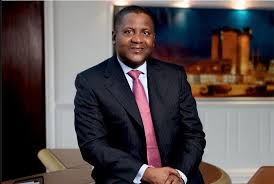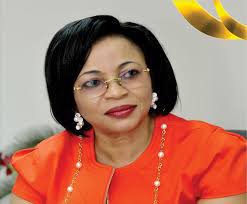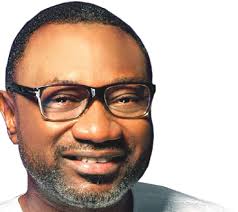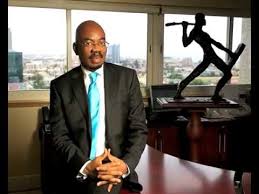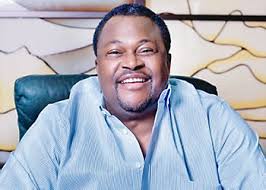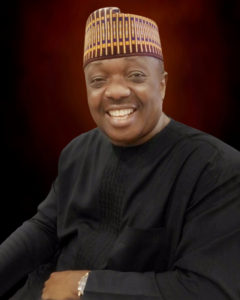Aliko Dangote
Aliko Dangote is unarguably the richest man in Africa. He was born on April 10 1957. He is the brain behind the Dangote Group, which has interests in commodities. The company operates in Nigeria and other African countries, including Benin, Ethiopia, Senegal, Cameroon, Ghana, South Africa, Togo, Tanzania, and Zambia. As of February 2017, he had an estimated net worth of US$12.5 billion.
Dangote is ranked by Forbes magazine as the 67th richest person in the world and the richest in Africa; he peaked on the list as the 23rd richest person in the world in 2014. He surpassed Saudi-Ethiopian billionaire Mohammed Hussein Al Amoudi in 2013 by over $2.6 billion to become the world’s richest person of African descent.
Dangote hails from a very prominent business family that lived in Nigeria for many years. He is the great grand son of Alhaji Alhassan Dantata, the richest African at the time of his death in 1955. Aliko Dangote, an ethnic Hausa Muslim from Kano State, was born on 10 April 1957 into a wealthy Muslim family. Dangote said, “I can remember when I was in primary school, I would go and buy cartons of sweets [sugar boxes] and I would start selling them just to make money. I was so interested in business, even at that time.
Despite the current economic crisis rocking the country, The Dangote Group which was established as a small trading firm in 1977 is still doing well.
Not only that, his conglomerates located in Benin, Ghana, and Togo are also doing well.
Dangote has expanded to cover food processing, cement manufacturing, and freight. The Dangote Group also dominates the sugar market in Nigeria and is a major supplier to the country’s soft drink companies, breweries, and confectioners. The Dangote Group has moved from being a trading company to being the largest industrial group in Nigeria including Dangote Sugar Refinery, Dangote Cement, and Dangote Flour.
In July 2012, Dangote approached the Nigerian Ports Authorities to lease an abandoned piece of land at the Apapa Port, which was approved. He later built facilities for his flour company there. In the 1990s, he approached the Central Bank of Nigeria with the idea that it would be cheaper for the bank to allow his transport company to manage their fleet of staff buses, a proposal which was also approved.
In Nigeria today, Dangote Group with its dominance in the sugar market and refinery business is the main supplier (70% of the market) to the country’s soft drinks companies, breweries and confectioners] It is the largest refinery in Africa and the third largest in the world, producing 800,000 tonnes of sugar annually. Dangote Group owns salt factories and flour mills and is a major importer of rice, fish, pasta, cement and fertiliser. The company exports cotton, cashew nuts, cocoa, sesame seed and ginger to several countries. It also has major investments in real estate, banking, transport, textiles and oil and gas. The company employs over 11,000 people and is the largest industrial conglomerate in West Africa.
Dangote has diversified into telecommunications and has started building 14,000 kilometres of fibre optic cables to supply the whole of Nigeria. As a result, Dangote was honoured in January 2009 as the leading provider of employment in the Nigerian construction industry.
Femi Otedola
Femi Otedola was born on November 4, 1962 in Ibadan, Oyo State into the family of former Lagos State Governor, late Sir Michael Otedola.
This astute entrepreneur is the chairman of Forte Oil Plc, an importer of fuel products. He is also the founder of Zenon Petroleum and Gas Ltd, and the owner of a number of other businesses across shipping, real estate and finance. He is the second Nigerian after Aliko Dangote to be included on the Forbes list of dollar-denominated billionaires. He has recently invested in power generation as part of the liberalisation of the sector in Nigeria.
In 2003, having identified an opportunity in the fuel retail market, Otedola secured the finance to set up Zenon Petroleum and Gas Ltd, a petroleum products marketing and distribution company.
As owner and chairman of Zenon, in 2004 he invested N15 billion in downstream infrastructure development and acquired storage depots at Ibafon, Apapa as well as four cargo vessels, amounting to a combined total storage capacity of 147,000 metric tonnes. The same year he acquired a fleet of 100 DAF fuel-tanker trucks for N1.4 billion.]
By 2005 Zenon controlled a major share of the Nigerian diesel market, supplying fuel to most of the major manufacturers in the country including Dangote Group, Cadbury, Coca-Cola, Nigerian Breweries, MTN, Unilever, Nestle and Guinness[.
In March 2007 it was announced that 10 banks had approved a syndicated loan of US$1.5 billion (N193.5 billion) to Zenon as working capital to build the largest premium motor spirit storage facility in Africa. Later that year, Zenon acquired a 28.7 per cent stake in African Petroleum, one of Nigeria’s largest fuel marketers. Zenon also invested across the financial sector, becoming the largest shareholder in a number of Nigerian banks including Zenith Bank and United Bank for Africa (UBA). As well as diesel, Zenon also became an important player in the kerosene market.
In 2007 Otedola was appointed chairman and chief executive of Africa Petroleum through the acquisition of a controlling stake in the business. In December that year, he personally acquired a further 29.3 per cent of the company for N40 billion. A merger of this personal holding with Zenon’s brought Otedola’s total stake to 55.3 per cent.
Following Otedola’s entry into the company African Petroleum’s share price rose sharply, increasing the market capitalisation from N36 billion to N217 billion in six months. In 2008, in response to public concerns over the availability and pricing of kerosene, African Petroleum launched an initiative to saturate the market and sell the fuel at N50 per litre from more than 500 service stations across Nigeria.
In March 2009, Otedola became the second Nigerian after Aliko Dangote to appear on the Forbes list of dollar denominated billionaires, with an estimated net worth of $1.2 billion. In October 2009 Otedola announced a move to upgrade African Petroleum’s liquefied petroleum gas (LPG) storage terminals in Lagos, Kano and Port Harcourt.] Difficult economic conditions caused by the slump in world oil prices and credit squeeze of 2008–09 led African Petroleum to record a loss in 2009.
In December 2010 African Petroleum rebranded, changing its name to Forte Oil Plc.[ Otedola carried out a restructuring of the business, focusing on technology and improved corporate governance Forte Oil returned to profit in 2012.
In 2013, as part of the Federal Government’s push to liberalise Nigeria’s ailing power sector, Otedola financed 57% of Forte Oil subsidiary Amperion Ltd, which acquired the 414 MW Geregu Power Plant for $132 million. Forte’s improved financial position and diversification into power generation resulted in a 1,321 per cent rise in its share price during 2013.] The first half of 2014 saw the company’s pre-tax profit more than double year-on-year to 4.19 billion naira ($25.7 million). Revenue growth for the whole year was 33 per cent.] In November 2014 Otedola returned to the Forbes rich list having dropped off it following the fall in share price during 2009.]
In September 2015 Forte Oil sold 17 per cent of its equity to Swiss commodity trader Mercuria Energy Group, giving Forte access to global commodity markets. The deal was thought to have given Otedola an estimated $200 million.
In 1994 Otedola established CentreForce Ltd, specialising in finance, investments and trading. He is also the owner of Swift Insurance.
Otedola is chief executive and president of SeaForce Shipping Company Ltd and was at one point Nigeria’s largest ship owner after extending control over the distribution of diesel products. One of his ships, a flat bottomed bunker vessel with a storage capacity of 16,000 metric tonnes, was the first of its kind in Africa.
In January 2006 Otedola was appointed a non-executive director of Transnational Corporation of Nigeria Plc, a multi-sectoral conglomerate established in 2004 by then-President Obasanjo to respond to market opportunities requiring heavy capital investment in Nigeria and across sub-Saharan Africa. He held this post until February 2011. Otedola has made a number of real estate investments, including a N2.3 billion acquisition in February 2007 by Zenon of Stallion House in Victoria Island in Lagos, from the Federal Government. The following month he was appointed chairman of the Transcorp Hilton Hotel in Abuja and tasked with driving its expansion and upgrade to a seven star facility. He is the owner of FO Properties Ltd
Otedola is married to Nana Otedola and has three daughters – Christine Oluwnmi, Florence Ifeoluwa and Elizabeth Temi – and a son, Fewa. Florence Otedola, aka DJ Cuppy, is a DJ and music producer, as well as a tourism ambassador for Nigeria. Her younger sister, Temi, is a style blogger and aspiring designer. Otedola has homes in Lagos, Abuja, Dubai, London, and New York City.
His companies are doing pretty well despite the country’s economic problems
Folorunsho Alakija
She is the only woman that made National WAVES list of seven Nigerian business people doing well despite economic woes. Folorunsho Alakija is a reputable businesswoman, one of the richest African women and also one of the richest black women in the world.
In 2014, she unseated Oprah Winfrey as the richest woman of African descent in the world.
She is a business tycoon involved in the fashion, oil and printing industries.] She is the group managing director of The Rose of Sharon Group which consists of The Rose of Sharon Prints & Promotions Limited and Digital Reality Prints Limited and the executive vice-chairman of Famfa Oil Limited. Alakija is ranked by Forbes as the richest woman in Nigeria with an estimated net worth of $2.1 billion. As of 2015, she is listed as the second most powerful woman in Africa after Ngozi Okonjo-Iweala and the 87th most powerful woman in the world by Forbes.
Folorunsho was born in 1951 to the family of Chief L. A. Ogbara in Ikorodu, Lagos State. At age seven, she travelled to the United Kingdom to begin a four-year primary education at Dinorben School for Girls in Hafodunos Hall in Llangernyw, Wales. After returning to Nigeria, she attended Muslim High School Sagamu Ogun State, Nigeria. Afterwards, she returned abroad for her secretarial studies at Pitman’s Central College, London. She also studied fashion design at the American College, London and the Central School of Fashion.
Folorunsho started her career in 1974 as an executive secretary at Sijuade Enterprises, Lagos, Nigeria. She moved on to the former First National Bank of Chicago, now FinBank now acquired by FCMB (First City Monument Bank) where she worked for some years before establishing a tailoring company called Supreme Stitches. It rose to prominence and fame within a few years, and as Rose of Sharon House of Fashion, became a household name. As national president and lifelong trustee of the Fashion Designers Association of Nigeria (FADAN), she left an indelible mark, promoting Nigerian culture through fashion and style.
In May 1993, Folorunsho applied for the allocation of an oil prospecting license (OPL). The license to explore for oil on a 617,000-acre block—now referred to as OPL 216—was granted to Alakija’s company, Famfa Limited. The block is located approximately 220 miles south east of Lagos and 70 miles offshore of Nigeria in the Agbami Field of the central Niger Delta. In September 1996, she entered into a joint venture agreement with Star Deep Water Petroleum Limited (a wholly owned subsidiary of Texaco) and appointed the company as a technical adviser for the exploration of the license, transferring 40 percent of her 100 percent stake to Star Deep. Subsequently, Star Deep sold off eight percent of its stake in OPL 216 to Petrobras, a Brazilian company. On 9 March 2016 she became the first female Chancellor (Osun State University) in Nigeria.
As of 2014, she is listed as the 96th most powerful woman in the world by Forbes. In May 2015 two Nigerian women, Finance Minister Ngozi Okonjo-Iweala and Alakija were listed among the world’s 100 most powerful women according to Forbes. Alakija was 87th on the list.
Folorunsho has a foundation called the Rose of Sharon Foundation that helps widows and orphans by empowering them through scholarships and business grants. Her company is also a major sponsor of the Agbami medical and engineering scholarship scheme, one of the most reliable scholarship schemes in Nigeria with over a thousand people yearly as beneficiaries. Mrs Alakija is a fervent supporter of education in Nigeria; for example in 2014 she donated a substantial amount of money to Ibrahim Badamasi Babangida University Lapai, the Niger State University. The money was used to complete the construction of a 350 Seat Lecture Theater, which was named after her.
She runs a flourishing business despite the economic crisis rocking the country.
LUCKY OMOLUWA
He is one of the upwardly mobile businessmen who sure know their onions. He is the Chairman/CEO of Pinnacle Communications Ltd, Tarmac Nigeria Limited, Centagon International School and many others.
Lucky Omoluwa’s landmark achievements came to bare when his company, Pinnacle Communications Limited paved the way for Nigeria to join the league of nations that have migrated from analogue to digital broadcasting. This did not come easy as Pinnacle had to surmount the hiccups and challenges to emerge winners of the 2nd Broadcast Signal Distribution License Network for transition from analogue to digital.
Inspite of the short deadline, it took the company six weeks to secure, clear, built up the site and installed what is generally said to be a state of the art transmission systems at the Pinnacle Mpape site.
The successful launch of the Pinnacle Broadcast Centre, Mpape by President Muhammudu Buhari who was represented by Vice President Yemi Osinbanjo would remain indelible in the memory of stakeholders in the broadcasting industry.
Following the switch on, Abuja residents can now watch close to 30 channels, offering fares in news, entertainment, sports and business for free.
He has won numerous awards from Nigeria, Ghana, United Kingdom and USA, among them are the Good Business Ethics from Harris Corporation USA, Outstanding Trade Contribution by US government, Outstanding Commitment to Business by Haris Corporation USA, Support for Trade Development by US government and the Dr. Kwame Nkrumah Outstanding Merit award in recognition of outstanding contribution and achievement as a businessman in the field of communication.
Ifeanyi Ubah
Ifeanyi was born as the first son of seven children to Mr. & Mrs. Alphonsus Ubah in Otolo, a small town in Nnewi North of Anambra State. Due to the inability of his parents to cater for the educational and material needs of their needs, Ifeanyi dropped out of Okongwu Memorial Grammar School, Nnewi, Anambra State to learn trade at a young age.] He has attended several local and international business courses and seminars in leadership and business management.
Upon the completion of his apprenticeship, Ifeanyi became an international exporter of motor tyres and spare parts majorly in West Africa including Ghana, Sierra Leone, Liberia and DR Congo before he expanded his business ventures in some countries in Europe including Belgium and the United Kingdom.
In 2001, he founded Capital Oil and Gas Limited which has since went on to become one of the largest distributors of petrol products around Nigeria with a combined capacity to berth 3-6 vessels simultaneously and 32 loading arms He is the founder of The Authority Newspaper, a Nigerian daily newspaper and also the owner of Ifeanyi Ubah F.C., a football club in the Nigeria Premier League, following its purchase as Gabros International Football Club.
In 2014, Ifeanyi Ubah unsuccessfully contested at the 2014Anambra gubernatorial election under the platform of the Labour Party.
Ifeanyi Ubah is married to Uchenna Ubah, a Business Administration graduate from Ahmadu Bello University, with whom they have 5 children. He also runs a foundation called Ifeanyi Ubah Foundation. He sits atop a thriving business inspite of the down turn of the economy.
Jim Ovia
He was born on November 4, 1951 and is one Nigerian businessmandoing pretty well for himself. He founded Zenith Bank in 1990. After gaining degrees at both Southern University and University of Louisiana at Monroe, he attended Harvard Business School. He served as CEO until 2010, when he transferred into the chairman role. He has been the recipient of a Nigerian national honor.He retired as pioneer Group Managing Director / Chief Executive Officer after two decades of meritorious leadership which positioned the bank as one of the largest and most profitable banks in Africa. As an accomplished banker with over three decades experience, he introduced a great deal of innovations into the Nigerian banking industry.
Jim Ovia is also the Founder of Visafone Communications Limited. He is the Chairman of the Nigerian Software Development Initiative (NSDI) and also Chairman, National Information Technology Advisory Council (NITAC). He is a member of the Honorary International Investor Council as well as the Digital Bridge Institute (DBI). He is also the Chairman of Cyberspace Network Limited.
Jim Ovia is a member of the Governing Council of Lagos State University, Lagos and also a member of the Board of Trustees, Redeemer’s University For Nations, Lagos. He was a member of the Governing Council of the Nigerian Investment Promotion Commission (1999 – 2007) and also served on the board of American International School, Lagos [2001 -2003].
Jim Ovia is a noted philanthropist and has headed numerous Non-Governmental Organisations [NGO] at various times including being the first President of the Nigeria Internet Group (2001-2003). He is the founder and Chairman of Mankind United to Support Total Education (MUSTE), a philanthropic organization focused on providing scholarship for the less privileged, of which some of the beneficiaries are now qualified professionals in diverse fields. He is also the founder of the Youth Empowerment / ICT Foundation, which focuses on improving the socio-economic welfare of Nigerian youths by inspiring and motivating them to embrace Information and communication technology.
Jim Ovia holds a Master’s degree in Business Administration from the University of Louisiana, USA in 1979 and a B.Sc degree in Business Administration from Southern University, Louisiana, USA (1977). He is also an Alumnus of Harvard Business School (OPM).
Mike Adenuga
Agbolade Ishola Adenuga Jr was born on the 29 of April 1953. He is a respected and reputable Nigerian business tycoon, and the second richest person in Nigeria. His company Globacom is Nigeria’s second-largest telecom operator, and also has a presence in Ghana and Benin. He also owns stakes in the Equitorial Trust Bank and the oil exploration firm Conoil (formerly Consolidated Oil Company). Forbes has estimated his net worth at $5.8 billion as of 2017 which makes him second wealthiest Nigerian behind Aliko Dangote,as well as the third richest person in Africa. His father, the Oloye Michael Agbolade Adenuga Sr, was a school teacher, his mother Juliana Oyindamola Adenuga (née Onashile of Okesopin, Ijebu Igbo) a businesswoman of royal Ijebu descent.
Adenuga had his secondary school education at the Ibadan Grammar School, Ibadan and Comprehensive High School, Aiyetoro for his Higher School Certificate(HSC). He worked as a taxi driver to help fund his university education. He graduated from Northwestern Oklahoma State University and Pace University, New York with degrees in Business Administration.
In 1990, he received a drilling license and in 1991, his Consolidated Oil struck oil in the shallow waters of Southwestern Ondo State, the first indigenous oil company to do so in commercial quantity.
He was issued a conditional GSM licence in 1999; after it was revoked he received a second one when the government held another auction in 2003. His telecom company Globacom spread quickly and started challenging the giant MTN Group. It launched services in Benin in 2008, and has continued its spread across Ghana and Côte d’Ivoire, with more licences currently being prospected in other West African countries.
He was named African Entrepreneur of The Year at the maiden African Telecoms Awards (ATA) on 15 August 2007
In May 2015, Adenuga made a takeover bid to purchase Ivorian mobile telecom’s operator Comium Côte d’Ivoire for $600 million In 2012 he was made Grand Commander of the Order of Niger (Nigeria).
He also holds a Yoruba tribal chieftaincy as an Otunba of the Ijebu clan.

